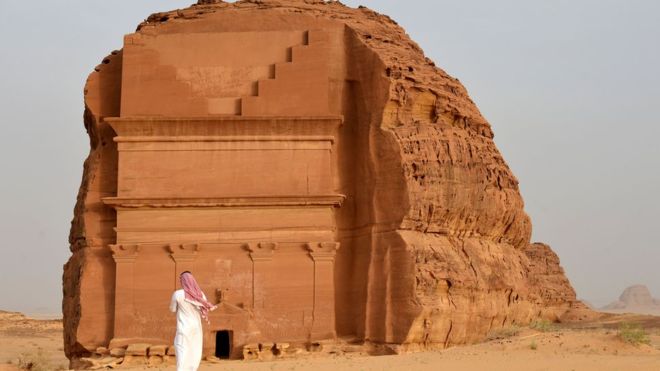Saudi Arabia will open its doors to international tourists for the first time as part of a broader push to cut its economic dependence on oil.
On Friday, the kingdom will launch a visa regime for 49 countries and relax strict dress codes for female visitors.
Tourism Minister Ahmad al-Khateeb described it as a "historic moment" for the country.
Visas have until now largely been restricted to pilgrims, business people and expatriate workers.
Saudi Arabia is also hoping to secure foreign investment in the tourism industry. It wants tourism to rise from 3% to 10% of gross domestic product by 2030.
"Visitors will be surprised... by the treasures we have to share - five Unesco World Heritage Sites, a vibrant local culture and breathtaking natural beauty," Mr al-Khateeb said.
Foreign women visitors will not be required to wear the body-covering abaya robe required to be worn in public by Saudi women, but must still maintain modest dress. There will also be no restrictions on unaccompanied women visiting the country.
"We have a culture. We believe our friends and our guests will respect the culture, but definitely it is modest and it will be very clear," Mr al-Khateeb said.
Non-Muslims will still not be allowed to visit the holy cities of Mecca and Medina and the ban on alcohol will be maintained.
More details on the scheme, including which countries are eligible, are due to be provided later on Friday.
But Mr al-Khateeb said he did not believe the recent attack on Saudi Arabia's oil industry would put people off visiting.
"Our cities are among the most safest cities globally. Therefore, we don't believe at all it will impact our plans. We have all the expats living in Saudi Arabia, enjoying Saudi Arabia. We're very secure," he said.
Tourism hopes
The moves to open up tourism is central to Crown Prince Mohammed bin Salman's wider economic reform programme that aims to reduce the kingdom's focus on oil.
Under the plan, Saudi Arabia wants to increase international and domestic visits to 100 million a year by 2030. The government expects to create one million tourism jobs.
Still, the push comes as the kingdom faces a tarnished international image amid criticism of its human rights record following last year's murder of journalist Jamal Khashoggi, and a recent crackdown on women's rights activists.
In 2017 Saudi Arabia announced a massive tourism development project that will turn 50 islands and other sites on the Red Sea into luxury resorts.
Last year construction began on Qiddiya "entertainment city" near Riyadh, which is to include high-end theme parks, motor sport facilities and a safari area.
SOURCE: BBC



